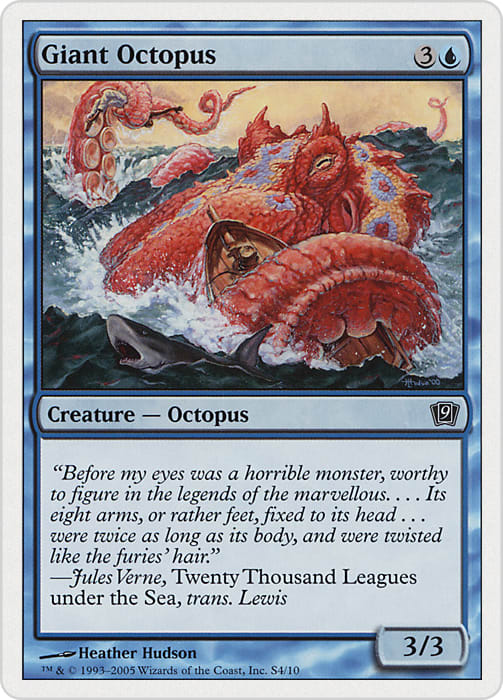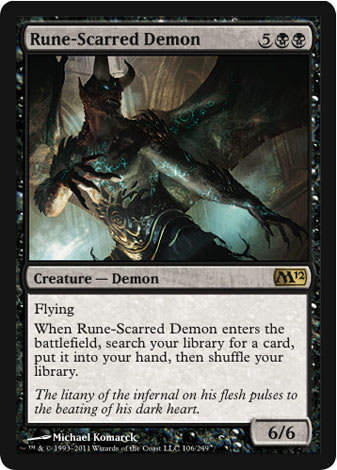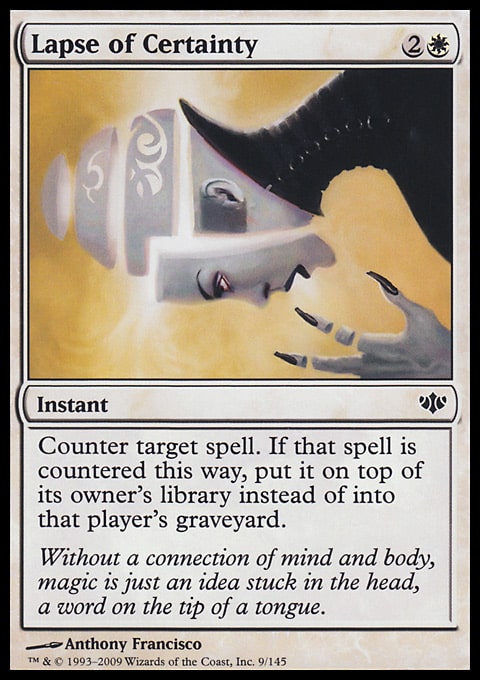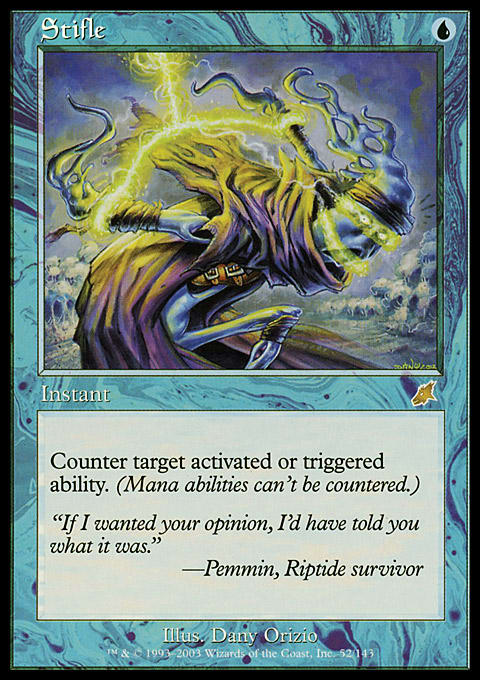Let's face it: Magic can be complicated. There are a lot of rules, a lot of different ways to bend and break those rules, and a ton of interactions which have to be tracked and understood. For those of us who play mostly multiplayer formats like Commander (that's me!), it gets even more complicated: does "Instant" mean "whenever I want"? If Judy played Farewell, and Jayden cast Negate, when can I cast my Swan Song to counter the Negate? Can I use my Shock on your Llanowar Elves? If so, when?
One of the next-level parts of Magic is the "stack", the method of managing spells and abilities so we know how to make the game do what we intend it to do (even if it's not what we want it to do). Most beginners can ignore the stack; if you're teaching someone a game with nothing but vanilla Creatures and Sorceries, for example, the stack won't matter and the new player can get a solid sense of how a game plays out.
But as soon as you have more than one thing going on, the stack becomes important. Let's talk through the basics, then a few exceptions.
The stack is a nebulous space where a spell goes before it has had its effect but after its costs have been paid. Let's say I want to cast a Giant Octopus. I tap an Island and three other Lands for four total mana and announce I'm casting my spell. My spell then goes on the stack, where it hangs out until it resolves. Once it resolves, it enters and becomes a Creature I can now block with, sacrifice, or otherwise use as a Creature.
What causes the Octopus to resolve? Now we get to talk about priority.
Priority are the moments in the game when you may perform legal game actions. When it's your turn, you have priority most of the time. During your Main Phase, you have the option to cast just about any spell, activate nearly any ability, or trigger abilities. (For more on what defines different abilities, check out another one of my articles!) You can do that knowing no one else can actually do anything right now, because you have priority.
Once you cast something, though, that changes. You cast the spell, but then you retain priority - meaning you can respond to your own spell if you want. There are a couple reasons why you might want to do that, but they're rare so don't worry about it. Most of the time, you put your spell on the stack and pass priority. In a heads-up game, that means your opponent now has the opportunity to do things. In a multiplayer game, priority passes in APNAP order - Active Player Non-Active Player. So you (the active player) go first, then you go around the table in turn order, giving each player priority each time.
(To answer the first question from the beginning of the article, "Instant" doesn't mean "whenever I want". It means "whenever I have priority". The key there is you can do that when it's not your Main Phase, a key difference from most other spells.)
Let's say instead of casting Giant Octopus, we're casting Rune-Scarred Demon. Our opponent, reasonably, doesn't like that. So we put Rune-Scarred Demon on the stack, then pass priority waiting for it to resolve. Our opponent takes priority and casts Aven Mindcensor. Aven Mindcensor goes on the stack, and our opponent passes priority. Now we have priority again, and we can respond to the Aven Mindcensor. Unfortunately, we don't have anything, so the Aven Mindcensor resolves, then our Rune-Scarred Demon resolves. We'll get to search for a card... in the top four cards of our Library. Bummer!
Notice what happened there - the Aven Mindcensor was cast second but resolved first. That's because the stack is a last-in-first-out thing. It's a literal stack - we put spells and abilities there, one on top of another, and once they're ready to start resolving, the one on top goes first.
The second thing to note is whenever anything goes on the stack, everyone must get priority before it can resolve. Let's take our Rune-Scarred Demon/Aven Mindcensor example, but put it in a multiplayer context. We cast our Demon and pass priority to Judy. Judy does nothing and passes to Jayden. Jayden does nothing and passes to Sam, who rudely casts that Aven Mindcensor. Now the whole process starts all over again, with Sam passing to us. We do nothing, but Judy, who's currently playing her very carefully built Captain Sisay deck, doesn't like the idea of Aven Mindcensor and casts Lapse of Certainty in response. Judy passes priority to Jayden, and they think this is hilarious but have no responses. Sam decides to let it go and passes to us, who do nothing.
Now we resolve. Lapse of Certainty was last in, so it resolves first, targeting Aven Mindcensor. Sam puts the Mindcensor on top of his Library, so that spell doesn't resolve - it fizzles, as we say. Then, finally, Rune-Scarred Demon enters play. Rune-Scarred Demon has a triggered ability when it enters, so now that ability goes on the stack and the whole process starts over (I wonder if Sam has Stifle?).
This may sound complicated, and it certainly can be, but most of the time it works fairly seamlessly. We don't normally have to announce passing priority - it just happens, especially when no one does anything. It's polite to make sure everyone has had a chance to understand what you're doing so they can speak up if they want to respond (like "any responses?"). It's especially true if what you're doing will affect someone else's board state or otherwise do something powerful (like that Rune-Scarred Demon).
Now we can answer the second question from the beginning - when can I cast my Swan Song? Answer: whenever I have priority. After Negate has been cast, I will get priority before it resolves. I cast my Swan Song then, targeting Negate. Because it's last in/first out, my Swan Song resolves first, countering Negate, and now Farewell will resolve.
Spells, activated abilities, and triggered abilities all use the stack. There are, however, a few common things which don't use the stack, and they're important too - mostly because it means no one can respond to them.
Playing your Land for turn doesn't use the stack. You can just play your Land and no one can do anything about it. They can't Shock you in response or anything. They'll have to wait till they have priority to send that Shock at your face.
Mana abilities -abilities which make mana- don't use the stack. These can be confusing because they look like activated abilities, thanks to the colon, but tapping your Llanowar Elves for mana doesn't use the stack and can't be responded to because you never lose priority. This is particularly important because someone can't Shock your Elves to attempt to keep you from the mana. They can kill the Elves (when they have priority), but you still get the mana. In fact, you can tap the Elves for mana even after it gets targeted with a Shock, as long as you do it before the Shock resolves. So, final question from the beginning: yes, you can Shock a Llanowar Elves, but only when you have priority, and it won't stop them from getting the mana.
Static abilities don't use the stack. An Archetype of Imagination makes it so your opponents' Creatures can't have flying. That's just true as long as the Archetype is out and stops being true when it's no longer out.
Costs don't use the stack. Tapping mana to cast a spell, or paying any other costs (like life, sacrificing something, or any other costs to cast a spell or activate an ability) can't be responded to. That means if I'm casting Altar's Reap and sacrifice my Plant token, you can't use that Shock (how many do you have?!) to kill my Plant in response before I've paid my cost.
Abilities which say "As" very often don't use the stack. This is where knowing the difference between a triggered ability and not matters. Rune-Scarred Demon has a triggered ability which uses the stack when it enters. Phyrexian Metamorph, on the other hand, just enters as a copy of something. You can't Shock the thing I'm copying in response to the Metamorph entering to stop me from getting the copy, because that copying didn't use the stack. If you really don't want them to copy that Grave Titan, you have to kill it in response to the spell being cast, before the Metamorph enters (or resolves) and force them to choose another Creature or Artifact to copy.
Because Morph comes up a lot in Commander games, flipping over a face-down card using Morph, Megamorph, or Manifest rules does not use the stack. It's a "special action" and cannot be responded to. Why? Couldn't tell you. But it's true, so no Shocking in response.
Because Cascade and Discover both come up in Commander a lot, I'd like to mention those as well. Spells with Cascade or Discover use the stack. The spell with Cascade goes on the stack, then waits there while the Cascade trigger occurs. The spell cast by Cascade goes on the stack, too, then will resolve first. That means if you cast Bloodbraid Elf and flip into (what else?) Shock, you can't target your own Bloodbraid Elf with the Shock because the Elf is still on the stack while the Shock resolves! If you want to respond to one of the spells on the stack (either the spell with Cascade or the spell it flips into), you can cast, say, Counterspell at any time when you have priority, but you must state which spell you're attemping to counter - in this case, for example, when the Shock gets revealed and priority gets passed, you could cast Counterspell and announce it's targeting Shock or the Elf, but the one you don't counter will still resolve. When there are multiple instances of Cascade, each one will go on the stack and resolve, one by one, so the first spell cast of Cascade will resolve before you Cascade for the next.
There is a lot more to this if you really want to dive in, but this should get you through most games of Magic, even with some complications. The biggest key to remember: Last in, first out. If you (or someone else) does something and someone has a response, that's normally enough to figure it out. Once more than one person starts responding, though, take a minute and start going through the steps - who has priority, who's passing it, and what are they doing with it? Then resolve things in the opposite order they went in and you'll get it.
Thanks for reading.



























